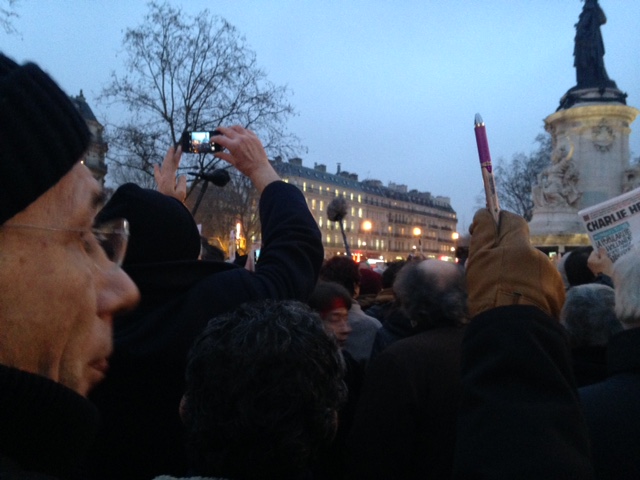 One hundred French intellectuals published a tribune in the daily ‘Le Figaro’ on March 20 denouncing what they call “the Islamization of France.” They write that there is a “new totalitarianism” which “threatens freedom in general.” The French media chose to ignore it.
One hundred French intellectuals published a tribune in the daily ‘Le Figaro’ on March 20 denouncing what they call “the Islamization of France.” They write that there is a “new totalitarianism” which “threatens freedom in general.” The French media chose to ignore it.
They are writers, historians, scientists and university professors. They come from both the right and the left. The one thing they have in common is their attachment to the secular nature of an inclusive French Republic which they fear is in grave danger of ethnic and religious seccession.
The authors of the text, titled “No to Islamist Separatism,” denounce a creeping take over of part of the population through a “communitarianism” which seeks to create a “new apartheid state” while pretending to denounce intolerance. These radical Muslims claim that, as the “dominated,” they can only find dignity by separating themselves from the “dominators,” they write.
The radicals seek to gain territory, impose their own religious intolerance while passing themselves off as the victims of intolerance. For the ethnologist, Stéphane Breton, “The Republic is being stabbed in the back.”
The authors ask whether these secessionists will force moderate “French Muslims, or those with Muslim culture without being believers, who love democracy and want to live with everybody,” to live separate.
The signatories denounce a “the most characterized expression of hate for our country and our democracy.” Among examples are the organization of forums to reflect on “state racism” where “Whites” are not allowed in. “They tell us that the best way to fight racism is that the ‘races’ be separated.”
A growing trend
The ground for Salafists and others who want to impose a distinct Sharia community for France’s Muslims is fertile. School long ago ceased to be the great integrator and school programs have been modified to cater to Islamic sensibilities. “ Courses dedicated to Islam in primary schools,” writes the journalist, Caroline Beyer, “look more like lessons of religion where one learns the ‘Five Pillars’ rather than privileging a historic approach.”
Urbanization has in fact de facto separated those of Muslim migrant background from the ethnic French. Large housing projects, called cités, built in the suburbs have become a breeding ground for fundamentalists and petty criminals. The police regularly denounce these “no-go zones,” where if an officer enters, he is sure to be insulted harassed and even attacked.
Youth unemployment in the Banlieues can reach 45%. The school drop out rate is astronomical. These marginalized youth are attracted to a radical Muslim identity as way of affirming their place in society. Traditional Imams have lost control.
“The radicalized long ago left the Mosque, which they find not radical enough.” Ahmet Ogras, president of the French Council on the Muslim Cult, told Le Figaro in February. “They escape us. They form marginalized groups and follow pseudo-teachings on the internet which we don’t control.”
A Europe wide petition called “STOP EXTREMISM” was launched last year by a Berlin Imam and an Austrian lawyer. They want to force the European Commission to take measures to fight “the Islamic fanatics who are holding Europe hostage and are financed by states outside of Europe.” (www.fr.stopextremism.eu). The signatures denounce a fanaticism which includes Salafists, those close to the Muslim Brotherhood and all groups which combat “the fundamental rights of the European Union, such as freedom of speech, freedom of religion, the right to dignity as well as equality between men and women.”
So far, “STOP EXTREMISM” has 936,000 signatures which is just short of the million they need to force the EU to act.
An imminent danger?
In France, the danger is real. The police now have some 20,000 radical Muslims on their “S-Files” as a security/terrorist threat. That is nearly twice as many as two years ago. French officials have long complained that in the Banlieues, a form of ‘Sharia police’ harass, intimidate and attack those who don’t conform to Muslim dress codes. Very often they are also petty criminals and drug dealers. The mere presence of police can spark a riot.
But more and more French Muslim youth, especially women, are voluntarily wearing clothes that demonstrate a strict adherence to the most radical form of Islam. Laws banning women from covering their faces in public have had little effect.
French politicians complain successive French governments have been too soft on the hardliners. “Emmanuel Macron has shown angelism on the question of communitarianism and Islamism,” said Valerie Pécresse, President of the Paris Regional Council, in an interview with BFMTV.
Others are calling for more police in the Banlieues, stricter respect for the secular nature of the school system, more prisons or taking away French citizenship from those with duel nationality, as have all those from North African migrant background. Some want to force unemployed, untrained and poorly educated youth between 18 and 25 into military service to learn “discipline, self-respect and love of country.”
The signatories of the tribune feel “republican universalism does not consist of denying the sexes, races or religions, but rather defines a civic space independent of them so that none is excluded.” They warn France could be faced with “a return to the wars of religion.” Others, including those in French intelligence, have warned of much worse.
That the French media chose to ignore the tribune may be indicative of an inherant fear of being labeled as “Islamaphobe,” which in France is a very politically incorrect thing to be. In this sense, the radicals have already set the agenda.
